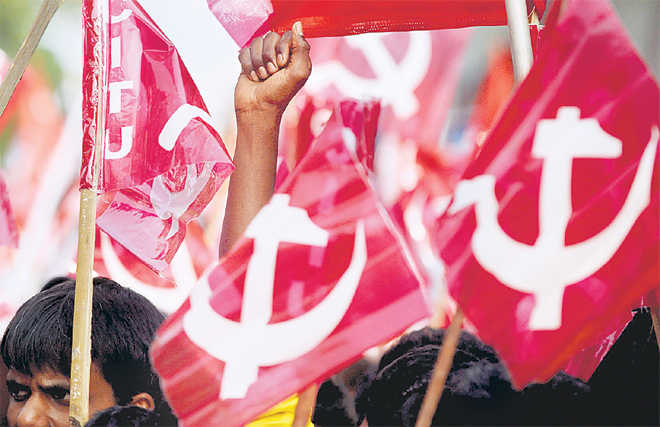
Forever Unequal: There is a constant struggle against a capitalist social order.
CP Bhambhri
Karl Marx has been immortalised in the history of ideas on the basis of his numerous philosophical and theoretical writings, especially the three volumes of Das Kapital, in which he offered a seminal critique of the political economy of capitalism by employing, for the first time, the method of materialistic interpretation of history. The enormous impact of Marx’s original contributions was felt across the territorial and geographical boundaries of the countries of Europe, North America and Asia. Not many could have remained insulated and immune from the ideas contained in his writings.
Marx had pointed out “multiple contradictions in the functioning of capitalism”. These, he said, were the logical products of the capitalist system of production for private accumulation of profit by ruthless exploitation of the working classes, the real producers of wealth. This logic of capitalist system of production led to great social inequalities, not only within the capitalist countries, but also the colonies which were the site of ruthless exploitation by the capitalist colonising countries of Europe. European capitalism developed while the whole of colonised Africa, Latin America and Asia, including India, became “underdeveloped” because the Western capitalist colonisers “looted and robbed” the colonies of their wealth.
Marx alerted through his intellectual contributions to the fundamental structural cause of “inequality” within societies and between the developed capitalist countries which were “colonisers” and the “colonies” which were the object of ruthless exploitation by the European capitalist colonisers. This fact was mentioned by Marx in his writings on India which he had published in newspaper articles in the US.
Marx referred “to the bleeding process of India” under British rule which left India extremely poor and backward. Marx also described British rule of India as “beneficial” because it shook the foundations of an “unchanging India”. Marx described the British rulers as “unconscious tools of history” and felt some of their policies proved “beneficial” to India. Indian historians have challenged Marx’s understanding that India was “stagnant” in the middle of the 19th century.
However, the relevant issue is Marx, by following the social dialectical approach, pointed out both “the positive” and the “negative” consequences of British rule. But Marx was not an armchair philosopher and social theoretician. He observed that “philosophers have interpreted history, the time has come to change it”. For achieving this goal, he organised and participated in “working class struggles” against capitalist social order based on exploitation in Germany, France, et al and for this he was “exiled”.
The real message of Marx was that “theory should be combined with praxis” for social transformation. This is the reason that many communist parties across continents, including India, have been inspired by Marx’s teachings and doctrines of social revolution. Socialist movements and struggles for social equality have been inspired by Marx’s teachings and model of social struggles for changing the existing unequal social order based on exploitation. Marx arrived in India through Indians studying in England. Many tall leaders of the Indian national movement, on arrival from England, jumped into struggles for not only the independence of India, but also for “equality”, socialism and Communism. Moreover, it was not only Marx’s philosophical and theoretical ideas which had inspired Indians studying in England.
The Russian Communist Revolution of 1917 had also attracted the attention of sensitive Indians who were in England. A grand experiment of transformation was taking place in backward Russia and Indians, like other British and European intellectuals, were attracted towards the “alternative of socialism” offered by the Communist Party of Russia. Jawaharlal Nehru, who on his return from England had jumped into the struggle for the freedom of India, visited Russia and was highly impressed by the “religion-less society” which the communists had created. The Congress Socialist Party had some leaders who were pushing the agenda of radical socialism and the Communist Party of India was also formed in the mid-1920s, inspired by Marx and the Russian Revolution of 1917.
The British rulers were ruthless in suppressing the CPI and the famous Meerut and Cownpore (Kanpur) conspiracy cases are important historical events when Indian communists faced the worst suppression by colonial rulers.
Post-Independence India launched its democratic journey on the basis of universal adult franchise and elections after every five years. The CPI and socialists participated in these elections in a regular manner and both later formed governments in some states as well as organised working class trade unions and peasant organisations. Not only this, the ideas of Marx and socialism are a significant part of the intellectual life of India and its universities. Artists, poets and many other creative people are not only influenced, but also firmly believe that only the socialist-communist system can establish “equality” in an “unequal” society like that of India.
The ideas of Marx, communism and socialism got a great setback after the fall of the Berlin Wall in 1989; the collapse of the communist system in Russia in 1991; and the abandonment of Maoism in favour of “market socialism” in China. The 21st century has been described as the age of the end of ideology. Equality has become a dirty word and even mild ideas of welfare state are under attack, and market capitalism has become the watchword of every capitalist country, whether developed or an emerging economy.
A critical question is; has the god of communism/socialism really failed? The answer to this question is a big no. Human beings in history have always made struggles and sacrifices to achieve equality to social relations. Can humans willingly accept a social order based on inequality and exploitation? Marx remains relevant because capitalism is essentially based on the principle of inequality, and socialism is the only known system in history which can provide a social order based on equality. This is the reason that socialist/communist parties in Europe “liquidated” themselves after 1991.
However in India, communist and socialist parties continue to pursue their goals. The greatest teaching of Marx is that humans make their own history through their own struggles, and in India, struggles for social equality are still on public agenda. This is the relevance of Marx.
The writer is Professor Emeritus, Centre for Political Studies, JNU



























